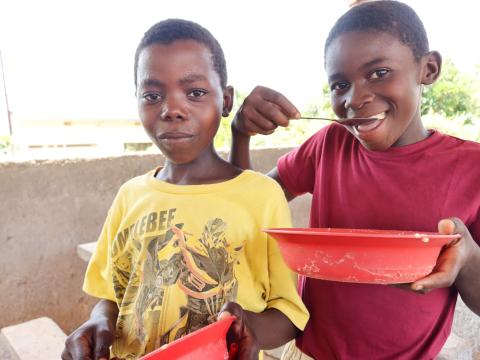Day of the African child: Education for all: School Feeding makes all the difference

World Vision considers the decision by the Government of the Republic of Mozambique to integrate the school lunch component into the Education Strategic Plan as a strategic move. It should be remembered that the plan has as one of its priorities the "gradual and sustainable expansion of the National School Feeding Program in Primary Education, giving priority to the districts with the highest rates of food insecurity and child malnutrition." World Vision considers this a step in the right direction in efforts to improve access to education and school retention and achievement.
Lessons learned, and good practices documented in various countries and regions have already shown that school feeding can be a differentiator in efforts to reduce malnutrition rates, whose negative impact on children's cognitive development is irreversible. It is also the only alternative often left to needy families under pressure from the rising cost of living.
World Vision urgently calls for the necessary investments that the National School Feeding Program (PRONAE) needs, both from the General State Budget and from donors and the private sector. It is only through these crucial investments that we can establish a sustainable school feeding program that caters to the needs of the thousands of children whose extreme vulnerability hampers their right to education.
World Vision's message alludes to the Day of the African Child, marked on June 16 this year, under the slogan "Education for all children in Africa."
Meanwhile, World Vision is committed to continuing to support the Government of the Republic of Mozambique, as evidenced by the recent launch of "Partnerships for Sustainable Education Results" (PARES), which over the next five years will benefit more than 85,000 pupils in 157 schools in the districts of Meconta and Monapo, in the province of Nampula, and the district of Milange, in the province of Zambézia. PARES" is a project that aims to help improve the literacy skills of schoolchildren and promote the use of good health, nutrition, and diet practices. To achieve these results, the project will carry out various activities, especially school meals. The project is valued at 35 million dollars, financed by the United States Department of Agriculture.
Over the years, World Vision has successfully provided more than 1.5 million school meals daily to students in 160 schools across the Muecate and Nacaroa districts in Nampula province. This achievement is a testament to our strong partnership with the Ministries of Education and Human Development, Health, and Agriculture and Rural Development, and it underscores the potential for the National School Feeding Program to make a significant impact in the future.